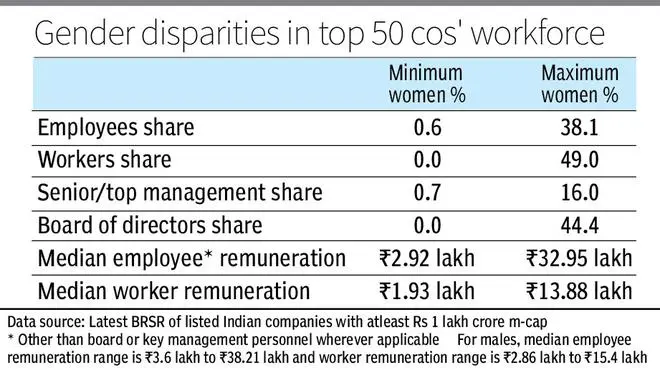Raksha Bandhan festival (August 30) signifies the empowerment of sisters who tie the rakhi (a cotton bracelet). Similarly, gender representation in the workplace involves empowering women to take on leadership roles, put their skills to use, and make significant contributions.

Across the globe, large public enterprises face mounting pressure to enhance gender representation in boardrooms, C-suite positions, and workforce roles. Research, from agencies including S&P Global, consistently highlights the correlation between gender diversity and sustained profitability and stock performance.
So, what’s the status of gender diversity in leading Indian companies like Reliance, ITC, Adani Group, and Tatas? A bl.portfolio analysis of India’s 50 largest firms (with a market capitalisation of at least ₹1-lakh crore) uncovers that two-thirds of these companies individually have fewer than 20 per cent women employees.
- Also Read: Ensuring gender parity. Companies step up efforts to ensure gender parity in leadership roles
Unpacking Gender Disparities
On average, men comprise 84 per cent of the workforce in the top 50 companies (which constitute more than half of the nation’s stock market wealth and employ over two million and an additional 1 million workers). The most recent data, part of respective business responsibility and sustainability reports (BRSRs) of these companies, reveals that in 24 of these firms, over 90 per cent of employees are male. This includes various Adani Group entities (Enterprises, Power, Green, and Ports), Bajaj Finance, L&T, Tata Motors, RIL, Grasim, and HAL. Only 15 companies boast over 20 per cent women employees. Notable examples include Infosys, Avenue Supermarts, TCS, Tech Mahindra and ICICI Bank.
Slicing the numbers into board, senior management and worker levels shows that at the board level, the representation of women appears satisfactory for most of the top 50 companies. 41 of these firms have a minimum of 10 per cent female board members (rules mandate at least one woman director). Tech Mahindra and Hindustan Zinc stand out with over 40 per cent women on their boards. HDFC Life, UltraTech, HDFC Bank, HCL Technologies, and Asian Paints feature women comprising 30 per cent of their boards.
- Also Read: Gender parity. Govt readies plan for sweeping policy interventions for restoring women’s dignity
However, the skewed gender composition in corporate ranks finds its origins in the underrepresentation of women in senior management roles, a phenomenon often referred to as the “glass ceiling.” None of India’s top 50 firms see women occupying 20 per cent of senior/top management positions. Tata Motors leads the pack with 16 per cent, followed by Bharti Airtel (14.3 per cent), TCS (13.3 per cent), and Hindalco (11.5 per cent). However, Adani Ports, Maruti, NTPC, and JSW Steel have one to three per cent senior roles filled by women.
The gender diversity scenario among workers remains stark, with a ratio of 92:8 in favour of males in the largest public firms. Of the 28 companies that disclosed their figures on this front, 24 have less than 10 per cent female workers. Adani Power, Maruti Suzuki, L&T, Siemens, and JSW Steel, which focus on manufacturing, see males constituting 99-100 per cent of their workers. In contrast, Titan Company and Britannia emerge as trailblazers, employing about 40-50 per cent female workers, while ITC stands at 12 per cent.
Gender Pay Disparities
Globally, wage disparities between men and women endure across various sectors. This pay gap can discourage women from entering or remaining in certain roles, affecting their overall representation. Pay commonly aligns with experience and seniority, and if women predominantly hold junior positions, their overall earnings could be affected. Among 45 companies disclosing relevant data, male employees’ median remuneration averages 19 per cent higher than that of female counterparts in 36 enterprises. This gap may be due to a larger proportion of women in junior roles.
For example, Bajaj Auto’s median male remuneration stands at ₹22 lakh/year, surpassing median female remuneration by 57 per cent. This discrepancy could be attributed to male employees’ average experience of 15 years compared to 5 years for female employees. Companies like SBI have explicitly mentioned about gender-agnostic compensation philosophy in their BRSR. IT giant TCS also says remuneration remains consistent for men and women in full-time roles, sharing the same grade, position, location, and level of experience. Interestingly, companies like Pidilite, Tata Steel, and Bharti Airtel witness higher median remuneration for female employees compared to their male counterparts.








Comments
Comments have to be in English, and in full sentences. They cannot be abusive or personal. Please abide by our community guidelines for posting your comments.
We have migrated to a new commenting platform. If you are already a registered user of TheHindu Businessline and logged in, you may continue to engage with our articles. If you do not have an account please register and login to post comments. Users can access their older comments by logging into their accounts on Vuukle.